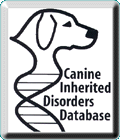
Gluten-sensitive enteropathy
This is a disorder of the small intestine that results from a sensitivity or intolerance to gluten, the protein part of wheat. There are many similarities to celiac disease in people, although the intestinal damage and clinical signs are less severe in dogs. Gluten-sensitve enteropathy is controlled by feeding a gluten-free diet.
unknown
Signs of this disorder are usually apparent by about 6 months of age. Affected dogs fail to gain weight normally or start losing weight, and most develop chronic diarrhea.
There are various blood and fecal tests that will point your veterinarian to a diagnosis of gluten-sensitive enteropathy as a cause of your dog's diarrhea. The diagnosis is confirmed if the clinical problems resolve following the introduction of a gluten-free diet.
This disorder is treated by feeding a nutritionally balanced gluten-free diet to your dog for life. Typically the signs resolve within 4 to 6 weeks of the diet change.
Low serum folate and reduced xylose absorption are indirect evidence of proximal small bowel disease. Serum cobalamin and duodenal juice culture are generally normal. Jejunal biopsies show partial villous atrophy, typically by 4 months of age.
Affected dogs should not be bred and until more is known about inheritance of this disorder, it is prudent to avoid breeding their parents and siblings as well.
FOR MORE INFORMATION ABOUT THIS DISORDER, PLEASE SEE YOUR VETERINARIAN.
- (Disorder) related terms:
- Disorder Type:

